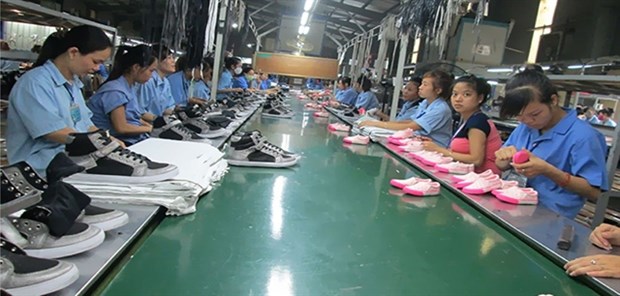 |
| Most leather products like bags, suitcases, and sports shoes will be exempted from export duty when they reach the EU right after the EVFTA comes into force |
According to Phan Thi Thanh Xuan, deputy chairwoman of the Vietnam Leather, Footwear and Handbag Association (Lefaso), the local business community simply cannot wait for the enforcement of the agreement (EVFTA) so that they can access the related tax incentives when exporting to the EU.
Particularly, the item categories currently making up 37 per cent of Vietnam’s total footwear export volume to the EU will immediately enjoy zero per cent tariff, whereas the remainder will see tariffs go down gradually from the current average 12.5 per cent to zero following roadmaps going from three to seven years.
The tariff on sports shoes will fall to zero per cent immediately from the current 17 per cent after enforcement, while handbags and suitcases will enjoy similar incentives, just the tariff on shoes with leather upper will be cushioned gradually based on a seven-year roadmap.
“The COVID-19 has left many labourers in the sector jobless as orders were either cancelled or postponed by business partners, leading to dwindling revenues. Now, with the EVFTA coming into force, each export order to the EU will reap extra income thanks to tax incentives,” Xuan opined.
Some businesses have reported unsold inventories piling up due to COVID-19 implications and recounted expectations that these stocks could clear once the deal comes into force and EU countries gradually contain the pandemic.
Each year, Vietnam posts nearly $19 billion from footwear exports, with sports shoes holding a big proportion in the sector’s total export value.
Lefaso figures show that the country reaped $6.1 billion from footwear and bag exports to the EU last year, a 9 per cent jump on-year, equal to 27.7 per cent of the leather and footwear industry’s total export value.
Of the sum, $5 billion came from footwear exports, up 7.6 per cent and $1.1 billion came from the exports of bags, wallets, suitcases, hats, and umbrellas to the EU, soaring by 15.9 per cent.
According to a report assessing the implications of the EVFTA, compiled by the Ministry of Planning and Investment, the EVFTA ratification would push up footwear exports to the EU. The sector expects to see doubled growth rate in exports to the EU by 2025, with the total export value of footwear jumping by around 34 per cent and that of the whole sector by 31.8 per cent.
Vietnamese exports to the EU are forecast to grow at 5-10 per cent in the first five years, with a projected 3 per cent annual hike in the sector’s total export value.
Diep Thanh Kiet, deputy chairman of Lefaso, however, assumed that to achieve sustainable development with high trade surplus, the local footwear and bag sector needs to invest intensively into mainstream segments and increase localisation rate to meet the origin standards of new-generation free trade agreements like the EVFTA and the Comprehensive and Progressive Agreement for Trans-Pacific Partnership (CPTPP). VIR
Yen Thuy

VN footwear companies unsure about the future
The fate of 4 million workers in the footwear industry depends on the recovery of exports after Covid-19 ends.

Textile and footwear firms go local to survive pandemic
While most textile and footwear enterprises in Vietnam struggled to find alternative sources of raw materials to maintain production, some with local sources have survived during the COVID-19 pandemic.
 Businesses in the leather and footwear industry await the ratification of the EVFTA to cash in on the enormous tax incentives coming with the landmark deal.
Businesses in the leather and footwear industry await the ratification of the EVFTA to cash in on the enormous tax incentives coming with the landmark deal.